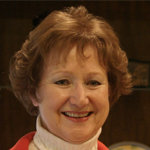
The following story was written by Sofia Kent and shared as part of the Memory Project.
This is a true story which I know only because my parents told me about it. I don’t have a lot of stories about their experiences during and after the Second World War, but I remember this one very well. They liked to tell it to me.
My parents were Jews born in Bendzin (also spelled “Bedzin”), Poland, where they lived vastly different lives. My mother grew up in a middle-class religious home; my father came from an upper-class, well-to-do background. I do not know how they eventually met and got married in 1940, when he was forty and she was twenty-five years old. I have been told that, during these terrible and scary times, people did not want to be alone; therefore, many tried to find a partner. Interestingly enough, until that time, my father was a confirmed bachelor. When they were rounded up with other Jews in the town, my parents had been advised not to go to the train, and they chose instead to take the trucks that were transporting people into forced labor camps. My mother’s parents decided to stay in their apartment and hide under the floorboards; they were never heard of again. My parents were lucky to be in the same camps and know that the others were still alive. In the camps, they were cruelly deprived of food and made to work very hard for long hours at a time. The labor took such a hard toll on my father, my cousin told me later, that, had the war lasted another three weeks, my father would certainly have perished from starvation and exhaustion.
The war ended, they were both liberated, and they found their way somehow to the RegainedTerritories in a town named Walbrzych (Waldenburg), Poland, where I was born in January 1946. When I was six months old, my family escaped from Poland with the help of Prime Minister and NATO chief Paul-Henri Spaak from Belgium, with whom my cousin’s Belgian family was somehow connected. With the Prime Minister’s help, my parents were able to obtain false passports that allowed travel by train through Czechoslovakia and then into Vienna, Austria. I can only imagine how frightened my parents felt during this trip, because, in addition to carrying false papers that stated that they were Greeks, they had a very uncharacteristically light-skinned baby–not the appearance of olive-hued Mediterranean people like the Greeks.
We ended up staying in Vienna for approximately nine months in a DP camp that was located in an old factory warehouse. There were pipes connected throughout the building. Some of these pipes were broken. This pipe system provided a “highway” for rodents to travel unimpeded from one floor to another. In this building, every family had a small space assigned to them, which made for very crowded conditions.
My father had smuggled dollar bills out of Poland. He had started a salvage business after the war and had earned and saved some money from his profits, but Polish law prohibited the taking of currency out of the country. To safeguard the money, he hid some of his savings in his shoes and smuggled dollar bills out of Poland.
One night, my father woke up and saw that a rat was trying to get into my crib. Having not a care in the world, I was sleeping innocently. My father did not know what to do! He could only think of protecting his little girl. Worried that the rat would harm me, he had to act quickly. Speed was important. He could think of only one thing, and that was to throw his shoe toward the crib to scare the rat away. He forgot that he had hidden money in his shoes. Even after all these years, I remember the big grin on my father’s face when he told me this story, one of the better memories of my childhood. I did not see my father smile very often.
I so cherish this memory and admire my parents to have been able to live a fairly “normal” life after all the hardship they went through.


What did your parents do as a job while at the camp?
My mother worked in an ammunition plant and my father did hard labor.
Layla Knopf
was your parents afterward the same people/liked did it change them?
As I did not know my parents before, I do not know, but what I do know is that my mother
screamed at nightly from her dreams.
What we’re your parents jobs before going to the concentration camps.
My mother worked in an office as a bookkeeper and my father worked in his parents business.
How did you push through and does your family have tattoos?
Not every Concentration Camp gave tattoos, my parents did not have tattoos.
Thank you for sharing your story
I feel that it is my responsibility to tell my story, to never forget.
You are so lucky to survive the Holocaust, and you are so brave to tell us your story about it, thank you.
Thank you for your comment.
I feel fortunate that my parents survived the Holocaust.
This is a very interesting story!
Did anyone question your parents on the train?
I do not know if anyone questioned my parents. Luckily we made it across the border.